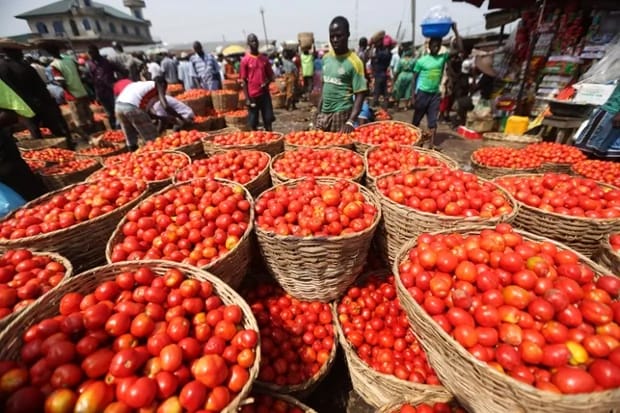Higher transport costs stoked by fuel scarcity
By Jeph Ajobaju, Chief Copy Editor
Multiplier effects of three straight weeks of fuel scarcity that has raised pump price and transport costs have filtered into food prices already high before the chaos. The struggle by the poor to buy garri, rice, beans, bread, and other staples has got tougher.
A survey shows the prices of food items have seen increases across major markets in Lagos as traders lament the sudden increase in transport costs.
Some commodities reduce in price, but price hikes in others outweigh decreases.
Snapshots of February price rises
- Garri (50kg, yellow) – N16,050 from N14,125 in January (up 13.63 per cent)
- Rice (50kg, foreign) – N32,775 from N27,875 (17.58 per cent)
- White beans (big bag) – N50,250 from N47,875 (4.72 per cent)
- Noodles (200g carton) – N4,238 from N3,400 (24.63 per cent)
- Tomato (big basket) – N15,250 from N13,625 (11.93 per cent)
- Sugar (500g, St’Louis cube) – N600 from N550 (9.09 per cent)
__________________________________________________________________
Related articles:
Fuel sells for N600 pl. Scarcity worsens. Buhari is missing
Petroleum Minister Buhari shifts fuel palaver blame on others
Buhari ignores yearly $4b oil theft, insists on taking loans
__________________________________________________________________
NBS inflation data
Nairametrics, which conducted the market survey, also quotes National Bureau of Statistics (NBS) data showing that headline inflation dropped to 15.6 per cent and food inflation to 17.13 per cent in January 2022.
Other average January prices:
- NBS attributed 17.13 per cent food inflation to increase in the prices of bread, cereals, food product, potatoes, yam, soft drinks, oil and fats, and fruits.
- The price of tomato rose 2.8 per cent in January 2022 against December 2021.
- The price of an onion bulb increased 5.27 per cent to N368.1.
- A loaf of 500g sliced bread in Lagos jumped 7.35 per cent to N460. The price of unsliced bread of the same size increased 6.7 per cent to N405.
- Prices of beef, rice, wheat, yam, chicken, egg, beans, among other, also rose.
- Prices did not reflect the effect of fuel rise across the country, especially in Lagos and Abuja, which began in February.
Nairametrics survey covers food items that witnessed price rises and decreases in February compared with January.
Price rises in February
Average price increases in February compared with January
- Pepper (big bag) – N12,895 from N12,125 (up 6.19 per cent).
- Pepper (medium bag) – N7,250 from N5,875 (23.40 per cent)
- Titus fish (1kg, Mackerel) – N1,825 from N1,513 (20.66 per cent)
- Garri (50kg, yellow) – N16,050 from N14,125 (13.63 per cent)
- Honeywell wheat meal (1kg pack) – N600 from N544 (10.34 per cent)
Price decreases in February
Average price decreases in February compared with January
- Palm oil (5 litres, local) – N4,200 from N4,600 (down 8.7 per cent)
- Abuja yam (big size) – N1,613 from N1,750 (7.86 per cent)
- Tea (pack, Lipton Yellow Label) – N300 from N320 (6.25per cent)
- Garri (50kg bag, Ijebu) – N17,000 from to N11,950 (29.70 per cent)
- Garri (50kg bag, white) – N14,250 (6.56 per cent)
- Cooking gas refill (5kg cylinder) – N3,063 from N3,313 (7.55 per cent)
- Cooking gas refill (12.5kg cylinder) – N7,513 from N7,850 (4.30 per cent)
Traders speak
Traders in the four markets surveyed in Lagos – Mushin market, Daleko market, Oyingbo market, and Mile 12 market – blamed the price rises on supply chain disruptions and higher transport fares.
“We are experiencing a significant increase in the price of rice in the market because of supply issues.
“Our dealers have not been able to bring in rice into the market, which is why the little available has witnessed a significant price increase,” said Iya Nike, a rice dealer at Daleko market.
Usman, a tomato trader at Mile-12 market explained that “when they bring in the tomatoes fresh to the market, the price is usually up, while later in the day, the price reduces because it is less fresh and probably have some spoilt ones in the bags already.”
He said petrol scarcity has also affected the price of tomato and other vegetables with the cost of transportation a major reason for the spike.
Mrs Chizoba at Oyingbo market added: “We continue to suffer from uncontrollable price increase in this country, which is making life harder for average Nigerians.”
Since the start of fuel scarcity, the prices of some food items have witnessed about 50 per cent rise in prices, she said.




